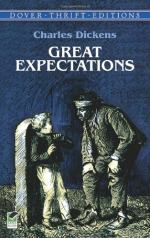“Which her name,” said Joe, gravely, “ain’t Estavisham, Pip, unless she have been rechris’ened.”
“I know, Joe, I know. It was a slip of mine. What do you think of it, Joe?”
In brief, Joe thought that if I thought well of it, he thought well of it. But, he was particular in stipulating that if I were not received with cordiality, or if I were not encouraged to repeat my visit as a visit which had no ulterior object but was simply one of gratitude for a favour received, then this experimental trip should have no successor. By these conditions I promised to abide.
Now, Joe kept a journeyman at weekly wages whose name was Orlick. He pretended that his Christian name was Dolge — a clear impossibility — but he was a fellow of that obstinate disposition that I believe him to have been the prey of no delusion in this particular, but wilfully to have imposed that name upon the village as an affront to its understanding. He was a broadshouldered loose-limbed swarthy fellow of great strength, never in a hurry, and always slouching. He never even seemed to come to his work on purpose, but would slouch in as if by mere accident; and when he went to the Jolly Bargemen to eat his dinner, or went away at night, he would slouch out, like Cain or the Wandering Jew, as if he had no idea where he was going and no intention of ever coming back. He lodged at a sluice-keeper’s out on the marshes, and on working days would come slouching from his hermitage, with his hands in his pockets and his dinner loosely tied in a bundle round his neck and dangling on his back. On Sundays he mostly lay all day on the sluice-gates, or stood against ricks and barns. He always slouched, locomotively, with his eyes on the ground; and, when accosted or otherwise required to raise them, he looked up in a half resentful, half puzzled way, as though the only thought he ever had, was, that it was rather an odd and injurious fact that he should never be thinking.
This morose journeyman had no liking for me. When I was very small and timid, he gave me to understand that the Devil lived in a black corner of the forge, and that he knew the fiend very well: also that it was necessary to make up the fire, once in seven years, with a live boy, and that I might consider myself fuel. When I became Joe’s ’prentice, Orlick was perhaps confirmed in some suspicion that I should displace him; howbeit, he liked me still less. Not that he ever said anything, or did anything, openly importing hostility; I only noticed that he always beat his sparks in my direction, and that whenever I sang Old Clem, he came in out of time.
Dolge Orlick was at work and present, next day, when I reminded Joe of my half-holiday. He said nothing at the moment, for he and Joe had just got a piece of hot iron between them, and I was at the bellows; but by-and-by he said, leaning on his hammer:
“Now, master! Sure you’re not a-going to favour only one of us. If Young Pip has a half-holiday, do as much for Old Orlick.” I suppose he was about five-and-twenty, but he usually spoke of himself as an ancient person.




